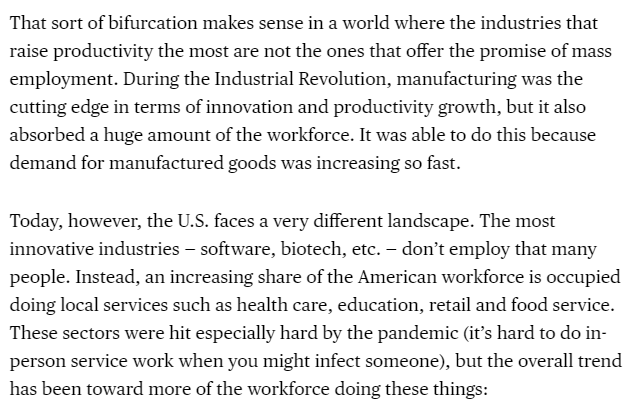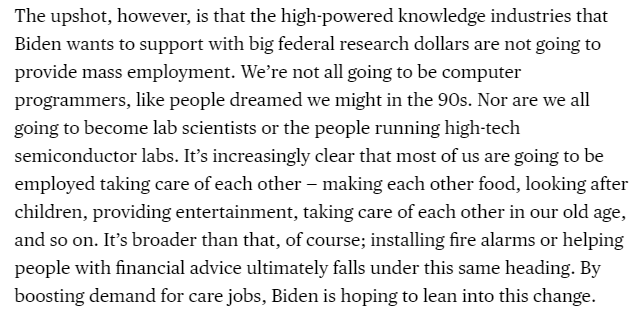
1/Let's talk about the two-track economy that I think Bidenomics is trying to create.
bloomberg.com/opinion/articl…
bloomberg.com/opinion/articl…
2/Basically the idea is that Biden wants to have super-competitive export industries to raise productivity, and then have domestic-focused service industries provide mass employment.
It's actually a smart plan.
noahpinion.substack.com/p/bidenomics-e…
It's actually a smart plan.
noahpinion.substack.com/p/bidenomics-e…
3/The cutting-edge industries just don't generate a ton of employment anymore.
This is partly because of technology, and partly because Asia has become the workshop of the world, which requires the U.S. to become the world's research park.
This is partly because of technology, and partly because Asia has become the workshop of the world, which requires the U.S. to become the world's research park.

4/If we're going to compete with China, we're going to need lots of robots and lots of high-skilled immigrants.
This is a program for productivity, NOT a program for mass employment.
So we need a second track for mass employment.
bloomberg.com/opinion/articl…
This is a program for productivity, NOT a program for mass employment.
So we need a second track for mass employment.
bloomberg.com/opinion/articl…
5/Remember how in the 90s we thought everyone would become a computer programmer, just like everyone had been an assembly-line worker back in the day?
Yeah, no. That was never going to happen.
Yeah, no. That was never going to happen.

6/Instead, most Americans will get jobs taking care of each other in various ways.
Preparing and serving food.
Treating each other's ailments.
Helping kids and old people.
Installing fire alarms.
Giving financial advice.
Teaching. Transportation. Psychotherapy.
Etc.
Preparing and serving food.
Treating each other's ailments.
Helping kids and old people.
Installing fire alarms.
Giving financial advice.
Teaching. Transportation. Psychotherapy.
Etc.
7/Biden understands this, so his economic program doesn't just focus on the competitive, lean, productivity-boosting knowledge industries. He focuses on mass-employment service industries too.
Smart!
Smart!
8/But there's a danger here, which is that this bifurcation could exacerbate economic class divisions.
A mid-career software engineer at a top company gets paid $400k a year or more. What does an elder care worker make?
A mid-career software engineer at a top company gets paid $400k a year or more. What does an elder care worker make?
9/In order to prevent class bifurcation -- and all the bruising fights over education, diversity, and other "gatekeeping" issues that go along with that bifurcation -- we can and should use the tax system to redistribute income.
10/But if we redistribute so much income that all the top talent goes to China, that's a problem. Japan has encountered this problem; its corporate system holds down the salaries of top talent, so top talent doesn't go to work for Japanese companies.
11/So we have to walk a middle path between bifurcation and leveling. There's a tradeoff here.
The two-track economy is smart, but it isn't perfect. No system is. We have to balance the risks as best we can.
(end)
bloomberg.com/opinion/articl…
The two-track economy is smart, but it isn't perfect. No system is. We have to balance the risks as best we can.
(end)
bloomberg.com/opinion/articl…
• • •
Missing some Tweet in this thread? You can try to
force a refresh







